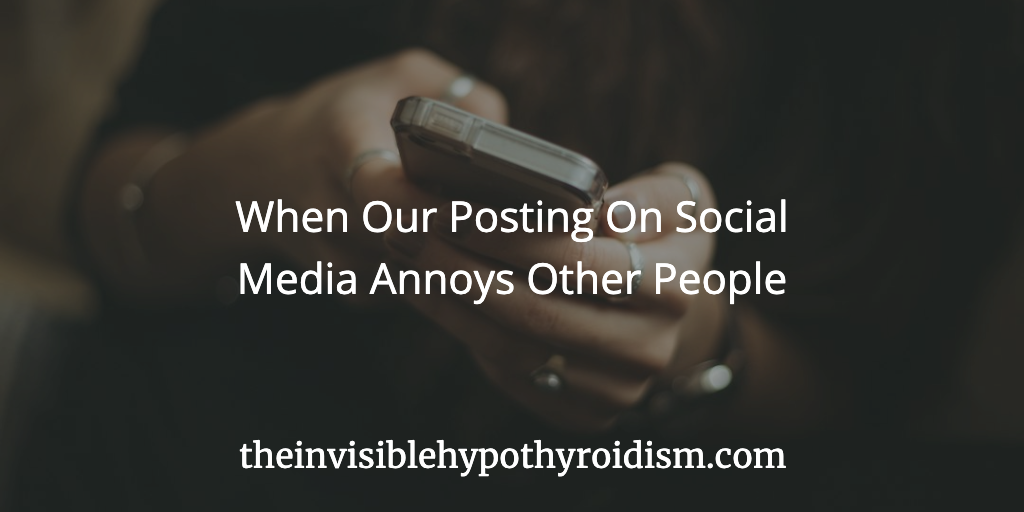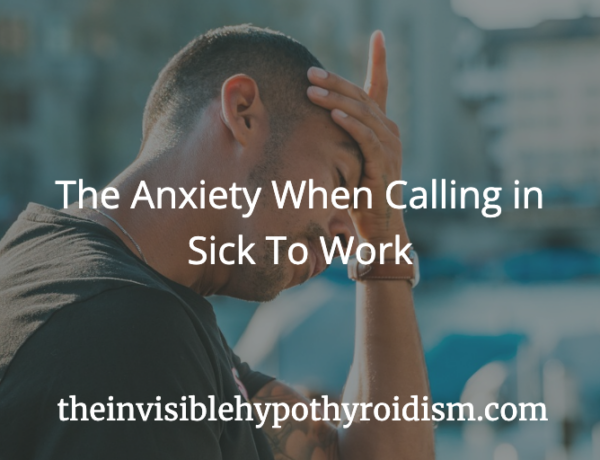People use social media to share life updates with friends and family, to discuss the shows they’re watching, watch funny videos and read articles.
Different people use these sites differently. Maybe you only post every now and then or it’s possible you post everyday. Do you use it to share happy news and positive posts or to possibly vent about your bad day or seek comfort and help from others? Maybe you do both.
Either way, it’s up to you how you use your account.
Have you ever shared something that irritated someone else? A status that someone deemed ‘sharing too much’, ‘yet another wallowing post’ or even ‘yet another selfie’.
The chances are, at some point, we’ve all shared or posted something online that another social media user has complained about. Perhaps they responded with an ironic, hypocritical post, moaning about the people who moan online.
So where does this tie in with those of us who live with thyroid conditions and all the other related health conditions?
My Experiences with Social Media and Health
I’ve had a back and forth relationship with social media and my mental and physical health.
When it comes to my health, I’ve had times of struggling but also times of success.
When I’ve struggled, I’ve gone through phases of retracting from social media altogether, because, quite frankly, it’s not at the top of my thoughts when I’m struggling with how ill I feel.
However, other times, I’ve used social media to let people know that I can’t cope.
It has been a cry for support and an easier way to say to people “Hey! I’m really struggling!” rather than picking up the phone and telling them bluntly.
Other times, I’ve felt like no one cares anyway, so why bother irritating them with my depressing posts on social media?
But isn’t that part of the problem?
If I’m worrying that people will see my posts and roll their eyes, then they aren’t the kind of people I should have in my life anyway, are they? I mean, they clearly don’t care about my well-being.
I’m not saying they should shower each post in love and overwhelming support, but they shouldn’t be irritated by the fact that I’m literally crumbling and close to having a breakdown either. That’s not compassionate.
How Others With Health Conditions Use Social Media
For some, social media is their only form of contact with the outside world.
When you live with a chronic health condition, such as thyroid disease, chronic fatigue syndrome, fibromyalgia etc. you may well not be able to work or leave the house very often.
Think about all the interactions a healthier person has on a daily basis; the people at the bus stop, work colleagues, customers or clients, the shop assistant when picking up milk on the way home, if you pass a friend or neighbour in the street… Someone with a chronic illness can go days or weeks without outside contact from anyone else. And that can be incredibly lonely, of course.
Sharing the trivial things online may substitute the conversations about trivial things they would otherwise have had with a neighbour, work colleague or shop assistant. Maybe they need to vent online, as they would vent to a friend. It’s healthy to get these things out, after all. For many, social media is a lifeline. It’s support. It replaces what their mental or physical health condition has taken away from them.
How Do You See It?
How many times have you, as someone with a health condition, started to write something, only to delete it before you post? Or have you deleted a post after you hit enter, with your heart racing as you think to yourself “I hope no one saw that. Why did I post that?!”
Perhaps you just needed to vent it out and put it on to a page, before deleting it and feeling a sense of relief. I’ve done this several times myself!
For those sharing their successes when they make progress in their health conditions, such as myself, even these posts can annoy and irritate other people. I’ve had things said directly to me about my more positive updates too!
Deciding How to Use Social Media
At times, I’ve told myself I’m not to post anything about my health, mental or physical, on my personal social media pages.
“Keep it all to the blog.” I tell myself. “The people who care will follow my blog.”
However, the truth is, I shouldn’t just be reaching the people who care. I should especially be reaching the ones who don’t, and convince them why they should care.
I should be raising awareness of thyroid disease and everything that comes with it.
“But what if people find me annoying for it? What if they think I’m self righteous, vain or over the top?”
Honestly, people don’t have to read what I post. They can scroll on by. They don’t need to moan or be so dismissive and mean. They can choose to educate themselves and show a little compassion. Instead, they think to themselves ‘Here Rachel goes again’, before scrolling on without much of a thought.
Whereas others may like filling up their social media profile with photos of their baby, their dog, food, memes, football posts, music, whatever – we spoonies are entitled to use ours just as we like, too. If we never want to mention how our health is, that’s fine. If we want to talk about it sometimes, that’s fine. If we want to talk about it often and share articles and try to educate others, then that’s just fine, too. Why? Because we’re entitled to do so, but people aren’t welcome to make us feel bad about it.
The Stigma
People are quick to jump to assumptions and judge, but they aren’t quick enough to ask if we need help or how we’re doing.
These types of people are feeding into the stigma that it isn’t OK to talk openly about mental and physical health and that we really ought to keep it to ourselves, battle on and feel ashamed about it. But we have nothing to feel ashamed about and we all cope with things differently.
Closing your eyes and covering up circumstances of mental health issues and people struggling with physical health conditions doesn’t eradicate them. It just makes it worse.
It’s really not hard to be a more compassionate person. Negativity and nastiness feeds more negativity and nastiness, and what good has that ever done to the world?
There will always be people who judge you and fail to understand what you’re going through. It is up to you to decide how much their opinion matters to you and if they deserve to remain a part of your life.
How do you feel about this topic?
***
Please remember that if you’re a thyroid patient living with poor mental health or lingering physical symptoms, that you don’t have to live this way. To address why you may still be feeling unwell (often despite being on thyroid medication too), please see this article and go through each suggestion, putting your thyroid jigsaw back together.
You can click on the hyperlinks in the above post to learn more and see references to information given.





